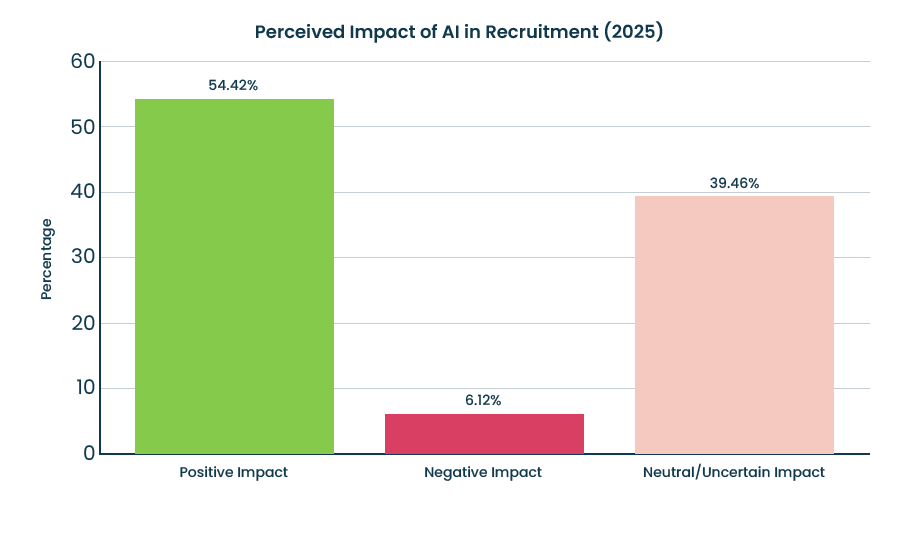AI in recruitment: Tech that’s transforming Talent Acquisition

Artificial intelligence (AI) is revolutionising the way organisations attract, engage, and hire top talent.
AI in recruitment refers to the use of machine learning algorithms and data-driven systems to automate and enhance different aspects of the hiring process. From intelligent resume parsing to predictive analytics, recruitment technology powered by AI supports both HR teams and staffing agencies in sourcing, screening, and selecting top talent faster and more effectively.
From automating repetitive tasks to analysing data and identifying the best candidates, AI is helping companies find the right talent faster and more effectively than ever before.
26% of companies globally use AI in some way for HR, according to SHRM.
- Are you reluctant to explore the tools in fear of ethical implications?
- Maybe you’re keen to integrate them into your hiring processes but don’t know where to start?
- Or perhaps you’ve been flying the AI flag in your recruitment processes for some time?
Whichever of the above is most aligned to your situation, this article aims to help you better understand the continual developments of AI in recruitment and how it is transforming the talent acquisition landscape.
10 ways AI is changing the recruitment landscape
As AI continues to reshape the hiring landscape, its impact on recruitment is being closely monitored by professionals worldwide. According to the Morgan McKinley 2025 Global Workplace Trends Survey, the majority of respondents view AI's influence in a positive light:
- 54.42% believe AI is having a positive impact on recruitment,
- 39.46% remain neutral or unsure, and only 6.12% feel the impact has been negative.

Overall, AI is offering new opportunities for efficiency and objectivity, but also raising important questions about fairness and ethics in the recruitment life cycle.
Here are 10 ways AI tools are transforming the recruitment world:
1. Automated screening and sourcing: AI recruitment tools can scan and review resumes/CVs, cover letters, and job applications to identify the most qualified candidates based on specific keywords, skills, and experience. This saves time and effort vs manual application reviewing. AI sourcing tools crawl multiple job boards, portfolios, and social media sites to identify active and passive candidates. These platforms aggregate talent into pipelines, ranked by predicted success rates. This enhances workforce planning by allowing talent acquisition teams to build proactive hiring strategies.
Intelligent resume parsers analyse applications and score candidates based on job fit. Some tools use natural language processing (NLP) to evaluate CVs against role descriptions and filter top applicants. This is especially useful for high-volume hiring or project RPO (Recruitment Process Outsourcing) models.
2. Candidate matching: AI algorithms can analyse job descriptions and candidate profiles to identify the best match based on skills, experience, and other factors. This helps to quickly identify the most suitable candidates for a particular role and reduce the time-to-hire.
3. Chatbots and virtual assistants: Chatbots and virtual assistants can interact with candidates, answer their questions, schedule interviews, and provide feedback on their application status. If properly mapped out, this improves the candidate experience and process flow.
4. Predictive analytics: AI can analyse vast amounts of data to identify patterns and trends that can help you make better hiring decisions. For example, predictive analytics can help identify which sourcing channels are most effective, which candidates are most likely to accept a job offer, and which employees are most likely to succeed in a particular role.
5. Diversity and Inclusion: AI can help remove bias from the recruitment process by focusing on objective criteria such as skills and experience rather than subjective factors such as name, gender, or ethnicity. This can help build a diverse workforce through more inclusive hiring.
6. Video interviews: AI-powered video interview tools can analyse candidates' facial expressions, tone of voice, and language patterns to assess their communication skills, emotional intelligence, and personality traits. This can help create a more accurate and objective assessment of candidates, especially for remote or international positions.
7. Employee retention: AI can analyse employee engagement surveys, performance reviews, and other data points to identify patterns that may indicate a risk of turnover. This can help address issues before they escalate and improve employee retention rates.
8. Talent mapping: AI can help you identify potential candidates for future roles by analysing their skills, experience, and career trajectory. This can help build a talent pipeline and reduce the time and cost of recruitment for future critical positions.
9. Continuous learning: AI recruitment tools can learn and improve over time based on feedback and data. This can help you continuously optimise your recruitment process and improve their hiring outcomes.
10. Ethical considerations: AI in recruitment raises ethical concerns around privacy, bias, and transparency. You need to ensure that your use of AI is responsible and ethical, and that you are transparent about how AI is being used in the recruitment process.
Tackling Bias and Ensuring Fairness
One major concern with AI in recruitment is the risk of reinforcing bias. However, modern tools increasingly focus on fairness by using anonymised data, bias-check algorithms, and inclusive datasets. For HR leaders, it's essential to regularly audit AI systems to ensure that algorithms enhance equity rather than compromise it.
What does the future hold for AI in recruitment?
The future of AI in recruitment is promising as more organisations are adopting AI-powered recruitment tools to streamline their recruitment process and improve their hiring outcomes.
- Conversational AI and Natural Language Processing (NLP): AI chatbots will become more sophisticated in engaging candidates, responding contextually, and even conducting structured interviews.
- AI-Driven Employer Branding: Recruitment marketing will increasingly rely on data-driven insights to personalise employer brand messaging to different candidate personas.
- AI Integration into Workforce Planning: Expect tighter alignment between HR analytics, performance metrics, and recruitment activities. AI will support succession planning, internal mobility, and contingent workforce strategies.
As AI continues to evolve, it will become an even more powerful tool to help find the right talent and build high-performing teams. However, organisations also need to be mindful of the ethical considerations and ensure that they are using AI in a responsible and transparent manner.
AI in recruitment requires the human touch
While AI has many benefits for recruitment, it is important to note that it is not a replacement for human judgment and expertise. Those responsible for hiring and talent acquisition still need to build relationships with candidates, assess their soft skills, and evaluate their cultural fit within the organisation.
In conclusion, AI is transforming the recruitment process by automating repetitive tasks, improving candidate matching, enhancing the candidate experience, providing predictive insights, and promoting diversity and inclusion.
Looking to adopt AI in your hiring strategy? Contact our consultants today for a tailored demo or discovery session.














